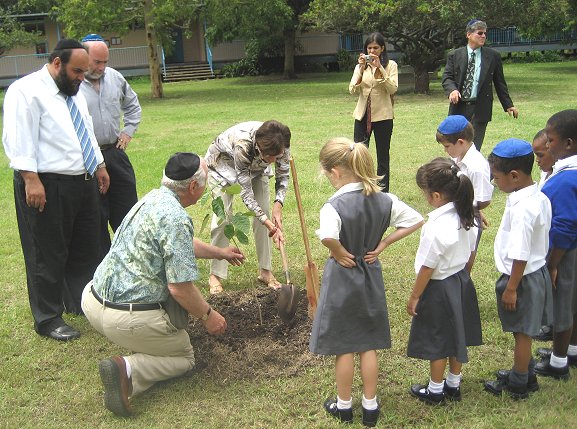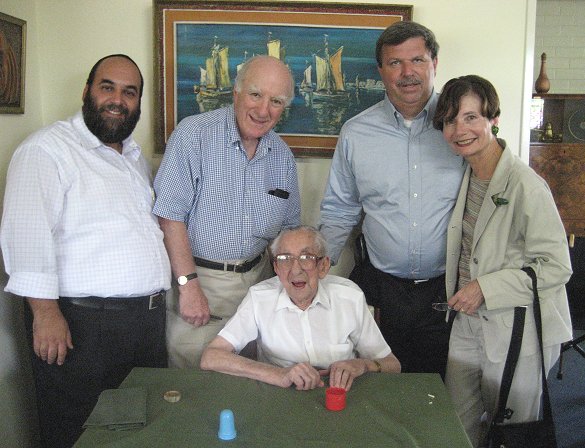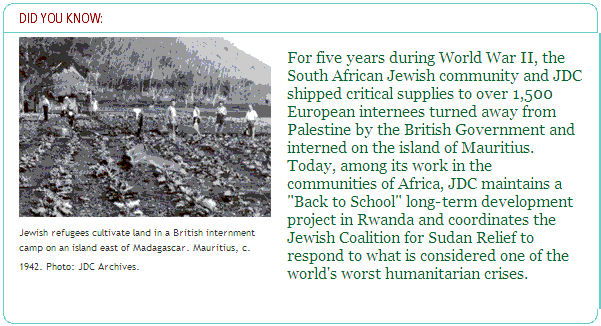|
US
‘JOINT’ DELEGATION SEES FOR THEMSELVES ZIMBABWE’S WOES – JANUARY
2007

Mr Shale Stiller of the Wineberg Foundation and Judge Ellen Heller,
President JDC planting a tree in honour of Tu B’Shvat while Rabbi
Moshe Silberhaft, ALBERT Bondie, Chairman of the Sharon School and
pupils look on

L- R – Rabbi Moshe Silberhaft, Shale Stiller, Steve Schwager, and
Judge Ellen Heller visiting
Reb Leizer Abrahamson (seated) aged 107
Life in Zimbabwe is a daily struggle for survival for both black and
white as the country's prolonged economic crisis continues its
downward spiral.
Recently, a delegation from the American Jewish Joint Distribution
Committee (JDC), conducted a fact-finding trip to the stricken
country, to ascertain the current state of the Zimbabwe Jewish
organizations and evaluate potential assistance to them within the
credo and policy of the JDC. To this end, meetings took place with
the leadership of the Harare Hebrew Congregation, Sephardi Hebrew
Congregation, Sharon School, Zimbabwe Jewish Board of Deputies,
Bulawayo Hebrew Congregation and the Jewish aged home, Savyon Lodge.
The JDC delegation was a high-powered one, comprising Judge Ellen
Heller (President), Steve Schwager (Executive Vice-President and CEO),
Shale Stiller (President - Weinberg Foundation), Irving Smokler
(Treasurer) and Michael Schneider (Hon. Executive Vice-President).
Accompanying it were Rabbi Moshe Silberhaft, Spiritual Leader to the
African Jewish Congress (AJC) and Peter Sternberg, one of the
vice-presidents of the African Jewish Congress.
An estimated 300 Jews remain in Zimbabwe, with 60% living in Harare,
the capital, and nearly of the remainder in Bulawayo. Despite the
difficulties of daily life, including dealing with the leadership
vacuum caused by emigration, the community remains close-knit and
active. The Bulawayo congregation, the oldest in the country, still
has the services of a spiritual leader, Rabbi Nathan Asmoucha.
In Harare, the Sephardi and Ashkenazi congregations now join for
purposes of maintaining regular minyanim, although they have not
formally amalgamated. Both centres maintain primary schools for the
remaining Jewish children, Sharon School in Harare and Carmel School
in Bulawayo. Sharon has ten Jewish learners in a total pupil body of
200 while Carmel School has just four. Savyon Lodge, is located in
Bulawayo and has twenty six residents. The representative body of
the community is the Zimbabwe Jewish Board of Deputies, which
amalgamated two years ago with the Central African Zionist
Federation.
During the visit to Sharon School, Judge Heller and her husband,
Shale Stiller, planted a tree in honour of the forthcoming Tu
Bishvat festival and also to commemorate the delegation's visit.
Rabbi Silberhaft spoke to learners on the significance of Tu
Bishavat at a special assembly.
At Savyon Lodge, the Delegation had the opportunity of meeting
Zimbabwe's oldest resident, Reb Leizer Abrahamson, whose 108th
birthday is due to be celebrated in April this year. Schwager
commented that Reb Laizer was certainly the oldest Jew he had ever
met and possibly the oldest in the world.
Members of the delegation also met with Dr Eric Bloch at the home of
Jurick and Tanya Goldwasser, former two-time mayor and mayoress of
Bulawayo. Bloch provided a comprehensive analysis of the local
political and financial situation in the country. Even though an
estimated three million people - nearly a quarter of the total
population - have left over the past decade, unemployment stands at
over 80%.
The inflation rate in Zimbabwe is just under 1500%, with a 5000:1
ratio of the Zim dollar the US dollar (this even after a three-zero
devaluation of the Zim dollar that took place recently). Inflation
has had the effect of wiping out people's savings. A million Zim
dollars, that ten years ago could have bought a comfortable house,
now barely buys a month's groceries. Rabbi Silberhaft mentioned the
case of an elderly Jewish couple who bought a kosher chicken for
Rosh Hashanah and had just now finished paying it off.
Judge Heller commended Zimbabwe Jewry on their sterling efforts in
maintaining Jewish life against all odds.
"The small Jewish community is small but remains Jewish and is proud
of its Jewish heritage and still practices Judaism. It is isolated
from the rest of the Jewish world and is in need not only of
financial support for individual cases but must be given support so
they know that the are not alone" she said.
The delegates also noted with approval the high standard being
maintained at Savyon Lodge, where the Jewish aged were "cared for
with dignity and encouraged to maintain their self respect".
Schwager said that the JDC regarded itself as "the 911 of the Jewish
world", hence its decision to see what was happening at first hand
on the ground in Zimbabwe.
"We found a once flourishing Jewish community in need of long term
capital and emergency needs that have to be addressed. Together with
the African Jewish Congress, we commit ourselves to making their
lives better" he said.

| |
Dear Board
Member,
Members of our
Board, my
children, and my
friends often
ask me if there
are Jews living
in a particular
country here or
there around the
world. I
generally
respond that
Jews—even as few
as ten Jews
living in
Myanmar in
Southeast
Asia—live in
virtually every
country around
the world.
During the last
two weeks,
Ellen, Shale
Stiller, Irv
Smokler, Michael
Schneider, and I
visited Jewish
communities in
both Zimbabwe
and then in Cape
Town and
Johannesburg,
South Africa.
This was the
first time in
our ninety-two
year history
that a JDC
president
visited these
two countries.
For those who do
not know,
Zimbabwe is the
former British
colony of
Rhodesia and is
located just
north of South
Africa. We
planned this
trip after
receiving
reports that the
small Jewish
community there
was having
significant
difficulty
meeting its
basic needs. Our
concern was
compounded by
the continuous
newspaper
reports of a
country living
in extreme
poverty and on
the verge of
economic
collapse.
Zimbabwe today
has about 12
million
citizens, of
which 20,000 are
white. The
poverty line for
a family of five
is $70 a month.
Eighty percent
of the
population lives
below this
level. The
government
reports 85%
unemployment,
with 1.6 million
people infected
with HIV-AIDS.
At its peak, the
Jewish community
totaled 7,000;
today there are
only
approximately
300 Jews who are
split between
the country's
two major
cities:
Harare and
Bulawayo. Both
cities were a
major surprise
to us. There
were many fine
homes owned by
both whites and
blacks and the
residents we met
downplayed the
crime and safety
issues. However,
every home had a
wall around it;
some were
surrounded by
electrified
fences.
The economic
situation is
continuing to
deteriorate for
all of
Zimbabwe's
citizens and
there is a large
and growing
black market in
currency. The
official
exchange rate is
$1 US to 250
Zimbabwe dollars
(ZWD).
On the black
market, $1 US
buys 5,000
ZWD.
Consequently,
prices in local
currency have
increased 1,000
percent a year.
What cost 1,000
ZWD at
the beginning of
2006 costs
10,000
ZWD
today.
As you can well
imagine,
pensioners and
all those
without access
to hard currency
have seen
radical declines
in their
standard of
living. Several
of the Jewish
elderly are
making ends meet
by having their
children send
money to them
from abroad,
which can then
be exchanged at
the black market
rate.
The community in
Harare now
numbers 180
members and it
has two
congregations
(Sephardic and
Ashkenazi), each
with its own
campus. But the
realities of the
day have forced
them to combine
congregations
for Shabbat
services so that
they will have a
minyan. Friday
night they pray
in one of the
synagogues and
on Saturday they
pray in the
other. However,
each
congregation
prefers to cling
to its own
facility rather
than face the
reality that
both campuses
could be sold
and their
proceeds used to
buy a smaller
facility which
would meet the
needs of a much
smaller and more
elderly
community. The
balance of the
money could be
used as an
endowment to
meet future
needs. JDC
clearly has a
role to play
here and we will
see if this can
be facilitated
with our
partners in
South Africa.
The community
also operates—on
a
self-sustaining
basis—a "Jewish
school" with 300
pupils, four of
which are
Jewish. The rest
are both black
and white
students who are
sent there
because of the
high quality of
education.
Tuition is about
$400 US a year.
The school has a
Jewish
curriculum;
while we were
there, the
students
celebrated
Tu
B'Shvat
and Ellen
planted a tree
to celebrate our
visit.
We went from
Harare to
Bulawayo by air.
The plane was
made in China,
but it was far
better than many
of the soviet
aircrafts that
we have flown in
on JDC trips.
From the
airport, we went
to
Sayvon
Lodge, the
Jewish
community's only
old age home,
serving 23
residents. We
spent time with
many of the
residents,
including three
senior citizens
over the age of
100. One
gentleman, Mr.
Leiser
Abramson, is 107
years old and in
good shape. The
home itself was
a tribute to the
caring
leadership in
the community.
It was
refreshingly
clean and
attractive.
We were told
that the
community
consists of 118
Jews, including
the 23 people
living in Savyon
Lodge, out of
the city's total
population of
1.5 million
residents.
Like
Harare, the
community has a
"Jewish school"
with an
enrollment of
250 children,
six of whom are
Jews. The school
is also
self-sustaining.
The curriculum
here, again, is
that of a Jewish
school with
black and white
students
learning Hebrew
and celebrating
the Jewish
calendar.
For the most
part, both
communities are
meeting their
basic needs from
funds that they
have on hand,
from relatives
sending money in
from abroad, or
from other
donations.
However, both
the
Harare and
Bulawayo
communities are
troubled by what
could happen if
a poor, elderly
Jew needed
significant
medical help
and/or medicines
that are only
available
outside the
country. They
also expressed
concern as to
how they would
deal with major
capital repairs
and renovations
to the Jewish
infrastructure.
The home for the
elderly, for
example, needs
an emergency
generator to
provide
electricity
during the
frequent
blackouts;
unfortunately,
they cannot
afford it.
Ellen and I
cannot
overemphasize
the significance
of our visit on
the morale of
the communities
in both
Zimbabwe and
South Africa.
The Jews living
there are
similar to the
remnant
communities in
other countries
we serve, such
as Morocco,
Tunisia, Egypt,
and Algeria in
North Africa.
They are far
from the major
Jewish centers
and they need to
know that world
Jewry will be
there to help in
times of real
need. In the
interim, our
visit has
certainly shown
them they are
not alone.
Ellen, Irv,
Michael, and I
will be
discussing the
issue further
and hopefully
making a
recommendation
to the Executive
Committee in
March to help
meet the
critical and
urgent needs of
the
Zimbabwe and the
other 13 small
Jewish
communities in
sub-Saharan
Africa. In this
part of the
world, you might
be surprised to
learn that there
are small Jewish
communities in
Botswana, Congo,
Kenya, Lesotho,
Madagascar,
Malawi,
Mauritius,
Mozambique,
Namibia,
Swaziland,
Tanzania,
Uganda, and
Zambia.
Ellen and I
firmly believe
that our
worldwide
mission of
rescue, relief,
and renewal in
the Diaspora
must also guide
our actions in
sub-Saharan
Africa. "All
Jews are friends
to one another."
Our leadership
has always said
that when there
is a Jew in need
and no other
help is
available, JDC
will be there.
We must seize
this opportunity
and respond, as
we always do, to
the needs of our
worldwide
family.
Until next time,

|
|
|
|
|



